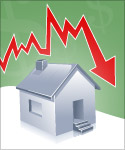
In Why are Billionaires Buffett and Trump Bullish on Real Estate Right Now? part 1, we stated that the Federal Reserve is committed to stable, steady long-term inflation.
But what about all this talk of hyper-inflation?
There are some doom-and-gloomers out there heralding hyper-inflation. Hyper-inflation means you wake up in the morning and a pound of coffee is $5, but when you go back that afternoon, it’s $7 and by the following morning it’s $10. In other words, the dollar is in free fall and it takes more and more dollars to buy the same goods and services. It’s happened many times in other countries in just the last 50 years. It’s ugly, especially for those who don’t know how to see it coming, how to prepare and what to do when it happens.
Now we understand the argument for hyper-inflation and it’s a good one. So let’s take a look at why real estate right now makes so much sense.
Real estate is arguably the best vehicle to hedge against hyper-inflation, and as we’ve already discovered, even if we have long term deflation and the property falls in price over time, as long as it cash flows, you’re fine.
So what happens to our real estate if we get hit with hyper-inflation?
First, everything real costs more in dollars. The more dollars created (easing), the less valuable they are. That’s why gold goes from $800 an ounce to $1800. It’s why oil is up (and you thought it was Iran). And in our previous scenario, it’s why it takes more and more dollars to buy the same pound of coffee.
So if you know that today’s $5 pound of coffee will be worth $10 tomorrow, do you want $5 in your pocket or a pound of coffee in your cupboard? Duh. You want the coffee in your cupboard. It’s holding its value, while the dollar crashes.
Now if you could borrow $5 from a friend today and add it to the $5 in your pocket, you could buy 2 pounds of coffee today. Then tomorrow, you could sell 1 pound for $10 and pay back your friend his $5 and you’d have a pound of coffee in your cupboard AND $5 in your pocket. Pretty good.
Meanwhile, your friend has his $5 back, which will now only buy a half pound of coffee. Ouch. So do you want to be the borrower (you) or the lender (your friend)?
If you didn’t track with all that, then go back and read it again and again until you do. Even better, go find a friend and discuss it until you both get it. It’s an important survival skill if the hyper-inflationists are right.
So what does this have to do with your real estate investing? A lot! And remember, when most financial pundits talk about real estate, they’re talking about the home you live in. We’re talking about owning homes that OTHER people live in – and pay you rent.
Now, in the aforementioned “coffee” scenario, how much money would you like to borrow EARLY in the inflation cycle so you could go stock up on coffee? Say ALL of it because that’s the answer.
Why? Because every dollar you borrow today becomes easier to pay back tomorrow as inflation roars. Debt is how you short a falling dollar. Think of it this way: If hyper-inflation hits, you can either short the dollar or lose your shorts.
Of course, the dangerous part of using debt to short the dollar is making the payments until you pay the loan back. But that’s why we have tenants – and last time we looked, having a roof over one’s head at night is a top priority (even over coffee… at least for most people).
And because housing is an essential human need, while many aspects of the economy will suffer, residential income property will probably be more stable. And owners of properly structured residential real estate will be in a position to do quite well as we'll see next.
So let’s take a quick look (we know you’re getting antsy) at our example property in a hyper-inflation scenario, then class is dismissed.
Let’s say you put $20,000 down on a $100,000 property today and it rents for $1,000 a month. And just like before, you have an $80,000 loan with a $500 a month payment. At the current rent, after expenses you clear $200 a month. So far so good.
Now hyper-inflation shows up and before too long, your $200 a month positive cash flow will only buy 10 cups of coffee each month. It sounds crazy, but go look at the what happened to prices in other countries (Mexico, Argentina, Yugoslavia to name a few) that have experienced hyper-inflation in recent history.
So now your $1,000 a month in rent is now only worth 50 cups of coffee. But guess what?
Your $500 a month mortgage payment is fixed. So even though your $1,000 a month rent isn’t worth much, it’s plenty to make the mortgage payment. So you’re okay. Whew!
Now let’s say that at the beginning you were paying attention (what a concept!) and saw the possibility of hyper-inflation. So when you originally purchased the property, you put $20,000 down, but took another $5,000 and bought 100 pounds of coffee at $5 a pound. Just in case.
Now when hyper-inflation shows up, coffee goes to $20 a cup and $1,000 a pound. Of course, if coffee is $1,000 a pound, what’s your house worth? Probably millions. But it doesn’t matter because you aren’t selling. Why would you? For dollars that are growing more worthless every day? Nah.
But what about your mortgage?
Could you sell 80 pounds of coffee stash for $1,000 per pound and use the $80,000 to completely pay off the mortgage? Yes, you could. And although the argument could be made that you wouldn’t want to pay off a loan, in a chaotic economy it might makes sense to remove all claims to the property.
Of course, you don’t need to use coffee to hedge. You could use gold, silver, copper or some other commodity, ideally something in high demand, but you get the idea.
The point is that the last thing you want to be in is dollars, which is why Robert Kiyosaki tells us “savers are losers”. The converse could also be said to be true, which is that “debtors are winners” IF you have the right debt (secured by an asset that cash flows at less than the cost of the debt).
We’re not saying real estate is “no risk”. There’s no such thing. But there’s also risk in doing nothing.
We’ve been at this for awhile, and we get to talk with lots of really smart people, and from our vantage point, there’s nothing we see on the horizon that looks better than properly structured residential income property for either deflation, inflation or hyper-inflation. But if you can think of something, let us know and we’ll check it out!
Knowledge is power, but only when acted upon.
The hardest part of real estate is finding the right markets, the right team and the right deals – especially if you don’t happen to live in an area where the numbers make sense.
Excerpted from the official newsletter of The Real Estate Guys™ Radio Show.




